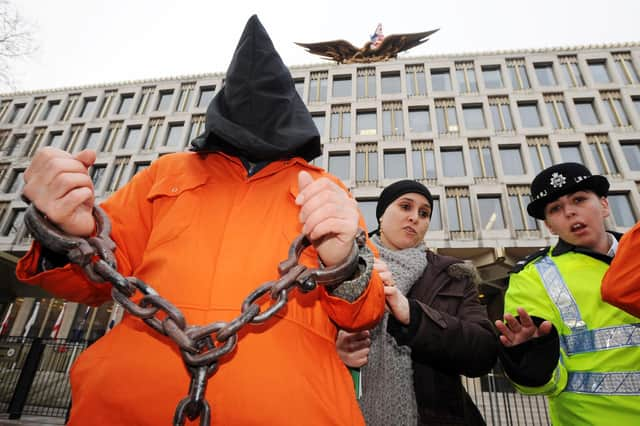In Syria, British people are being unlawfully detained in hellish detention camps that are becoming Europe's version of Guantanamo – Elish Angiolini


“We are profoundly sorry for the ordeal that you both suffered and our role in it,” she wrote to Fatima Boudchar and Abdel Hakim Belhaj. “The UK government has learned many lessons from this period.”
But what lessons? That Britain’s moral standing depends on its defence of the rule of law? That no-one is above the law and that the law’s protection extends to everyone? That there must be accountability for abuses, and that unless we reckon with our failures we are doomed to repeat them? It would be good to think so.
Advertisement
Hide AdAdvertisement
Hide AdSadly, the UK government’s recent record suggests the wrong lessons have been learned. It recently introduced the Overseas Operations Bill, which would have effectively decriminalised acts of torture by blocking prosecutions after five years.
All war crimes were eventually excluded from its scope, but only after a coalition of former military commanders, judges and ministers objected that the Bill would do grave damage to Britain’s reputation and expose UK personnel to the risk of prosecution at the International Criminal Court.
I am taking up the role of chair of the board of trustees at Reprieve at a time when the organisation’s work is needed more than ever. Reprieve fights in the courts of law and public opinion on behalf of people facing grave human rights violations, from death sentences to torture and arbitrary detention in the name of ‘national security’. While support for the death penalty is in decline globally, some authoritarian regimes are bucking the trend.
In Egypt, just last week, a dozen or more men were executed for taking part in an attack on a police station in 2013 in which several officers were killed. They had been convicted in a mass trial of 156 defendants. The exact number is hard to be sure of as the executions were carried out in secret and the men’s families received no warning.
In Saudi Arabia, authorities continue to seek death sentences against people arrested and charged as children, despite repeatedly claiming to have abolished the death penalty for minors. In both countries, the rhetoric of ‘counter-terrorism’ is used to justify the use of capital punishment.
For 20 years, Reprieve has defended the Right to Life, the Right to Freedom from Torture and the Right to a Fair Trial, set out in the Universal Declaration of Human Rights. The ‘war on terror’ era shows how foolish it is to take them for granted.
Last year First Minister Nicola Sturgeon received a letter from Reprieve’s client Saifullah Paracha, the oldest prisoner at Guantánamo Bay asking for her help establishing what role Scottish airports played in his rendition. “While I have never been to Scotland, I understand that it is a country that believes in justice,” he wrote.
The Police Scotland investigation into this matter, launched in 2013, has not yet concluded, in part because the US government is withholding crucial evidence.
Advertisement
Hide AdAdvertisement
Hide AdMeanwhile south of the border, the UK government has reneged on its promise to hold a judge-led inquiry into ‘war on terror’ abuses, despite Parliament’s Intelligence and Security Committee concluding there was a “corporate policy” of facilitating renditions.
The lesson learned from the ‘war on terror’ era by the UK government appears to be that even the worst abuses can be swept under the carpet. Reprieve does not intend to let this stand and, together with MPs David Davis and Dan Jarvis, is seeking judicial review of the decision not to hold an inquiry.
In the US, the election of Joe Biden offers hope that he will bring one shameful chapter to a close by shutting down Guantánamo, but for now the prison remains open.
None of Reprieve’s seven clients at the prison have been charged with a crime. Defence Secretary Donald Rumsfeld’s infamous claim that detainees were “the worst of the worst” has been exposed as empty rhetoric used to justify the indefinite detention of men swept up in the chaotic aftermath of the US invasion of Afghanistan.
Today, Europe’s politicians are once again embracing indefinite detention in the name of ‘national security’, and demonising a whole group of people to justify depriving them of rights.
In North East Syria, British and European nationals are being unlawfully detained in hellish detention camps, having been captured fleeing the collapse of the so-called Islamic State. These camps are fast becoming Europe’s Guantánamo: a place where people can be forgotten about, beyond the reach of the law.
Reprieve’s investigations have shown that the majority of the small number of British women in the camps were trafficked to Syria after being groomed by IS predators.
Rather than protect these trafficking victims, the government has in most cases stripped them of citizenship. One of Reprieve’s clients was trafficked at 12, forcibly married at 14, and became an adult in a prison camp. She has been abandoned by her country.
Advertisement
Hide AdAdvertisement
Hide AdThe USA has recognised that casting its citizens adrift in dangerously unstable camps is not a sustainable solution, and has repatriated 10 adults for prosecution, plus a further 18 women and children.
“Beyond being the best option from a security standpoint, repatriation is also simply the right thing to do,” ambassador Jeffrey DeLaurentis told the UN.
History tells us that we deprive people of the law’s protections at our peril. This, above all, is a lesson the UK government would be wise to learn.
Elish Angiolini is chair of the board of trustees of human rights non-profit organisation Reprieve and a former Lord Advocate
